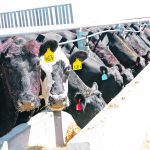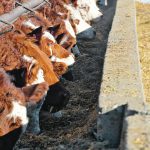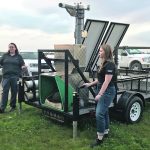The lingering drought in parts of the Prairies is changing the way some beef producers feed their cows.
Tag Archives feed efficiency

Drought drives stored feed, byproduct use in cow-calf herds
Total mixed ration mixers help make some byproducts more palatable

Economics key to methane reduction
New technologies also need an on-farm benefit, and some winners are showing up that help efficiency and profitability
When researchers reached the end of their triels of 3-nitrooxypropanol, a feed additive that reduces methane emissions, they also expected to see an increase in feed efficiency in the cattle that consumed it. They didn’t. Without a feed efficiency improvement, the adoption route for 3-NOP, known by its commercial name Bovaer, became more challenging. “The […] Read more
McDonald’s to pay for feed efficient corn use
Glacier FarmMedia – A partnership between McDonald’s and Syngenta, which will start in the U.S., will pay beef producers to use corn expected to improve the feed efficiency of cattle. Syngenta’s Enogen trait produces corn that contains more alpha-amylase enzyme, creating more efficient breakdown of starch to sugars. Enogen corn feed is about five per […] Read more

Research takes closer look at methane emissions
Study uses unique technology to measure the link between feed efficiency and enteric methane emissions in beef cattle
Feeding canola oil to beef cows could be one way to reduce their enteric methane emissions and increase feed efficiency. University of Guelph researchers adopted unique technology to investigate the link between feed efficiency and enteric methane emissions. Feed-efficient cattle reduce farmer costs, and lower enteric methane can help with greenhouse gas emission issues, creating […] Read more


